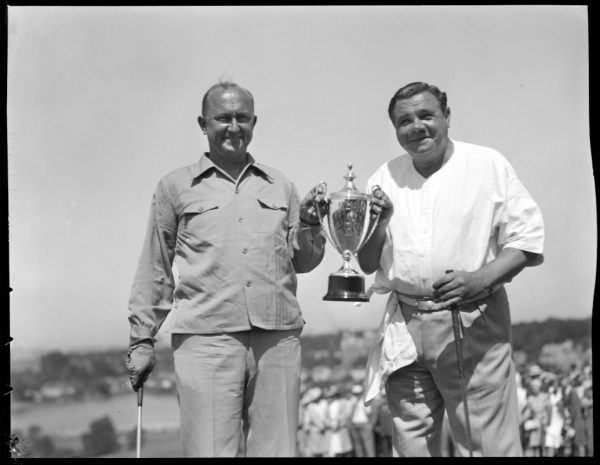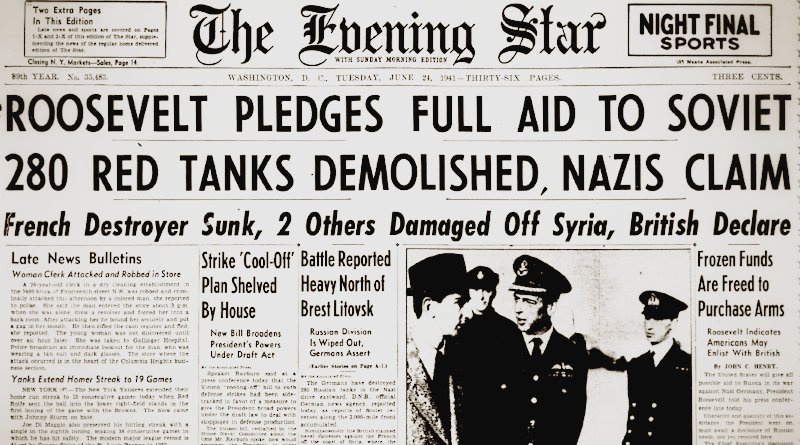World War II Chronicle: June 24, 1941
Click here for TODAY’S NEWSPAPER
On the front page: Hank Leiber1Leiber has recently been picked for the All-Star team, his third selection has been beaned in the head again. The Chicago Cub centerfielder is known for crowding the plate and New York Giant left-hander Cliff Melton knocked him out cold. Melton was Lieber’s teammate back in 1937 when a wild-throwing 18-year-old named Bob Feller threw a curveball that didn’t break during an exhibition game, knocking Lieber out for most of the season. He wouldn’t have wanted to dig in on Cliff’s brother Rube, who just debuted with the Phillies and can throw as hard as anyone in the majors. Rube will lead the league in walks and wild pitches in 1942. Speaking of brothers, Cliff was on the mound in 1938 when Lloyd and Paul Waner became the first brothers to hit back-to-back home runs…
Page two reports that the Germans are on an absolute tear through the Soviet Union. Pravda meanwhile says that the Red Army has pushed some German units out of the country and has taken thousands of prisoners. It would be interesting to add up how many prisoners captured, planes shot down, and enemy soldiers killed that the state-run papers reported throughout the war. Granted, not every ship we claimed sunk or plane shot down was accurate, but the fog of war accounts for much of that.
But you have to wonder what on earth was going on in Josef Stalin’s mind. The man was so paranoid he imprisoned or murdered millions of his own people. But he did nothing when he was warned the Germans were about to invade and had staged the largest force in world history on his borders. Stalin had absolutely decimated his military by ordering the execution of his best military officers and many others were being tortured in gulags. Was he just that stupid, or was he only concerned with power and knew that he could count on his manpower advantage to eventually defeat the Germans and conquer vast swaths of Europe?
I would argue that he was clever enough when it came to matters of staying in power and taking advantage of the West. But how many effective leaders and strategists were left in Russia after all the purges? You don’t want to stick out from the crowd when tyrants like Stalin are in power. Just blend in; don’t appear too smart, but also don’t be too useless. And do what you’re told. Whatever it is, no matter the cost. Perhaps this explains why Soviet forces performed so dismally for much of the war. You could argue that FDR was a tyrant and his policies deserve plenty of criticism, but at least under his leadership our Armed Forces were able to grow an incredibly talented pool of generals and admirals.
The German invasion has really changed the landscape of World War II. On page two, Moscow is saying that imprisoned Poles will be freed to fight the Germans. How badly would you want to fight for the regime that invaded your country and slaughtered tens of thousands in an unprovoked invasion? Meanwhile, the British are trying to figure out what Japan plans on doing now that their Ally has attacked the USSR, who have been supplying China and are on bad terms with Japan already. Sure, now would be a good time for Japan to attack, but it would also spread the Emperor’s troops even more thinly and would help the Americans and English, which neither Tokyo nor Moscow want. What a tangled web…
Page six reports the death of 1st Lt. Follett Bradley Jr., the first Army Air Force casualty in Britain. Bradley was testing the Boeing B-17’s high-altitude performance when the plane was hit by a bolt of lightning and lost control. It disintegrated over Catterick. Follett Bradley Sr. is the commanding officer of the 13th Composite Wing in Puerto Rico. He will become the commanding general of First Air Force next year…
Henry McLemore is embedded with Maj. Gen. George Patton’s 2nd Armored Division on maneuvers in Tennessee and is quite impressed with Patton’s leadership and the performance of the American tank force (see page 11)… Sports section begins on page 12 and tells about the bidding war for Michigan’s Dick Wakefield, who was signed on Saturday. The Nationals and Dodgers offered $40,000, the Indians $32,500 . On the following page is a column by Grantland Rice. Billy Conn and his fiancee are pictured on page 13. “The Pittsburgh Kid” is watching his hometown Pirates face the Brooklyn Dodgers. The caption mentions that the two would have already been wed, but the marriage was opposed by her father Jimmy Smith…
Babe Ruth and Ty Cobb face each other tomorrow at the Commonwealth Country Club (Newton, Mass.) to see who is the better golfer. Page 14 quotes the Babe who thinks he’s got a good chance at beating his former rival…

DiMaggio Streak
St. Louis Browns pitcher Bob Muncrief held Joe DiMaggio hitless until the bottom of the eighth inning in today’s game. This is the second time he has faced Muncrief since The Streak began, hitting two singles in six at-bats.
| AB | R | H | RBI | BB | SO | AVG | |
| DiMaggio CF | 4 | 1 | 1 | 0 | 0 | 0 | .352 |
His single extends the hitting streak to 36 games, surpassing Cobb’s 35-game streak in 1917. DiMaggio is now tied for fifth place. This is not his longest mark of consecutive games with a hit, however. Joltin’ Joe set a record for minor-leaguers in 1933 with 61 games.
Major League Baseball’s Longest Hitting Streaks (as of June 21, 1941)
| 1 | Willie Keeler | 45 | 1896-97 |
| 2 | Bill Dahlen | 42 | 1894 |
| 3 | George Sisler | 41 | 1922 |
| 4 | Ty Cobb | 40 | 1911 |
| 5 | Joe DiMaggio | 36 | 1941 |
| Gene DeMontreville | 36 | 1896-97 |
Evening star. (Washington, D.C.), 24 June 1941. Chronicling America: Historic American Newspapers. Lib. of Congress.
https://chroniclingamerica.loc.gov/lccn/sn83045462/1941-06-24/ed-1/
